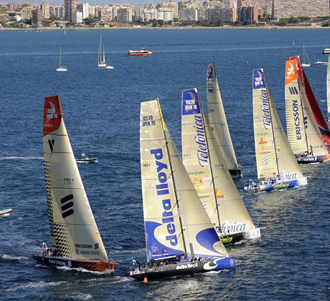

During the last America’s Cup, Oracle Team USA used data from 300 sensors on the boat as well as 3.000 variables that ran 10 times per second to win the cup. This resulted in about 1 gigabyte of raw data per boat per day as well as 200 gigabyte of video data that had to be analyzed. All data was stored in a chase boat that would cater for the analytical hub, where algorithms would combine 10 to 30 different data sources to predict what might happen in the next seconds or hours.
Several team members on the chase boat performed these real-time analytics. While one member for example was analysing data from the wing and sail, other members looked at trends or were monitoring the different systems on board the boat. All the results from the data analysis were returned to PDA’s that each team member on the boat was wearing. These customized, real-time results offered great insights for each team member based on the task at hand.
Thanks to all these data streams, powerful analytics and real-time insights, Oracle Team USA was able to win the America’s Cup. During this Volvo Ocean Race it is likely that more boats will follow the example from the America’s Cup and have access to massive data streams and powerful Big Data analytics. It therefore comes down to the analytical skills of the team that could make the difference.
The Dutch Brunel team for example, is working together with students from the University of Twente. In the past years they have developed the infrastructure capable of dealing with vast amounts of sensor data coming from the boat. The Brunel team has installed 160 different sensors on board the boat that monitor everything. They can combine this data with other external data sets, such as (historical) weather data, to determine the best sailing route. Also the Abu Dhabi Ocean Racing team is collecting all sorts of key performance data in order to enable the boat to continuously sail at peak performance.
With everything being the same on the seven boats participating in the Volvo Ocean Race, down to the toothbrush and sunglass holders, the skills are really all that matter. Being a highly skilled sailing team is of course a pre-requisite to compete in the challenge, but during this race the different data analytics teams will also play a key role. Those teams that are capable of extracting additional insights from all the data have a significant competitive advantage and, as we have seen with Team Oracle USA during the America’s Cup, a bigger chance to win. So this edition of the Volvo Ocean Race will not only be a great sportive challenge, but also a fantastic race from a Big Data perspective. May the best team win!
I really appreciate that you are reading my post. I am a regular blogger on the topic of Big Data and how organizations should develop a Big Data Strategy. If you wish to read more on these topics, then please click ‘Follow’ or connect with me viaTwitter or Facebook.
You might also be interested in my book: Think Bigger – Developing a Successful Big Data Strategy for Your Business.
This article originally appeared on Datafloq.